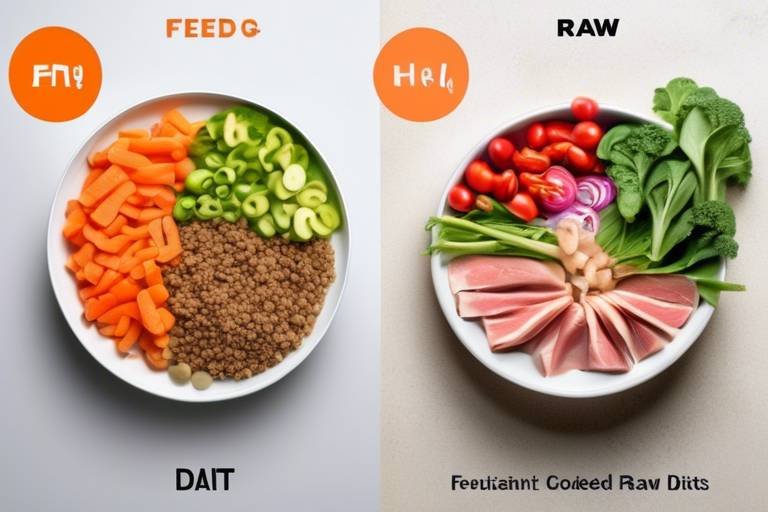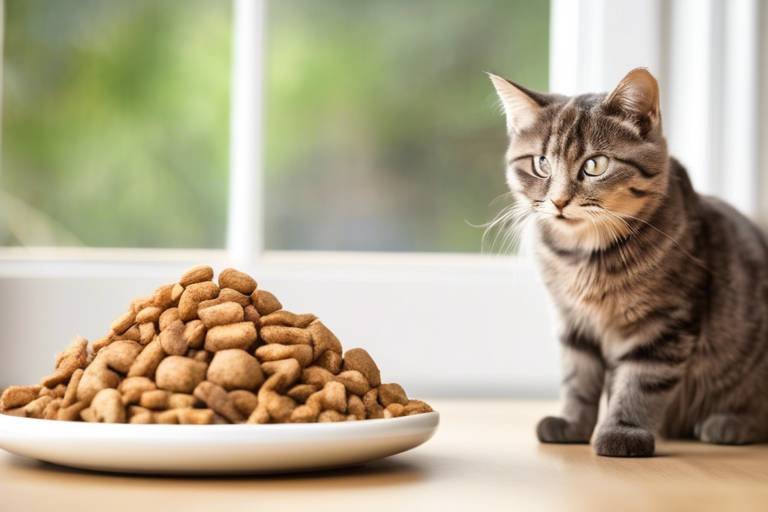Understanding the Connection Between Diet and Skin Health
Have you ever looked in the mirror and wondered why your skin looks the way it does? Well, let me tell you, the secret often lies in your diet! What we eat plays a monumental role in how our skin appears and functions. Think of your skin as a canvas; the better the materials you use, the more vibrant and beautiful the artwork. In this article, we’ll dive deep into how various dietary choices impact skin health, exploring everything from essential nutrients to hydration and the specific foods that can help you achieve that radiant complexion you've always desired.
When it comes to skin health, it’s not just about slapping on the latest moisturizer or serum. It’s about nourishing your body from the inside out. Imagine your skin as a sponge; it absorbs everything you feed it, and that includes the nutrients from your meals. This connection between diet and skin health is not just a passing trend; it’s backed by science and experience. So, let’s embark on this journey to uncover how the food on your plate can transform your skin!
Vitamins and minerals are like the unsung heroes of skin health. They work tirelessly behind the scenes to maintain skin integrity, keeping it looking youthful and vibrant. For instance, Vitamin A is essential for skin cell production, while Vitamin C plays a pivotal role in collagen synthesis, giving your skin its elasticity. On the other hand, Vitamin E is a powerful antioxidant that helps protect your skin from damage caused by free radicals. When you incorporate these essential nutrients into your diet, you’re not just feeding your body; you’re feeding your skin!
Here’s a quick rundown of some key vitamins and their skin benefits:
| Vitamin | Benefits |
|---|---|
| Vitamin A | Promotes skin cell production and repair. |
| Vitamin C | Boosts collagen production and brightens skin. |
| Vitamin E | Protects against oxidative stress and hydrates skin. |
Now, let’s talk about hydration. You might have heard the phrase, "You are what you drink," and it couldn’t be truer when it comes to skin health. Proper hydration is vital for maintaining skin elasticity and achieving that enviable glow. Think of your skin as a dry sponge; without water, it becomes brittle and cracks. When you stay hydrated, your skin retains its moisture, making it plump and radiant.
But hydration doesn’t just come from drinking water; it also comes from the foods you consume. Fruits and vegetables, such as cucumbers, oranges, and strawberries, are not only delicious but also packed with water. So, why not make hydration a delicious experience? Incorporating these foods into your daily meals can significantly enhance your skin’s appearance.
Antioxidants are like the bodyguards of your skin, helping to combat oxidative stress and inflammation. They fight off free radicals that can cause premature aging and dullness. Foods rich in antioxidants, such as berries, dark chocolate, and green tea, can work wonders for your skin health. By including these antioxidant-packed foods in your diet, you’re essentially giving your skin a fighting chance against the ravages of time.
Let’s shine a spotlight on Vitamin C, shall we? This powerhouse vitamin is renowned for its skin-brightening properties. It’s not just a pretty face; Vitamin C plays a crucial role in collagen production, which is essential for maintaining skin firmness. Moreover, it helps protect your skin from sun damage, acting as a natural defense mechanism. So, whether it’s a zesty orange or a tangy kiwi, make sure to load up on Vitamin C-rich foods!
Next up, we have the fabulous Omega-3 fatty acids. These healthy fats are essential for supporting skin barrier function and hydration. They help keep your skin moisturized and can even alleviate conditions like eczema. You can find Omega-3s in fatty fish like salmon, walnuts, and flaxseeds. Think of them as the secret ingredient to a supple, glowing complexion!
On the flip side, let’s talk about what to avoid. High sugar and processed food intake can wreak havoc on your skin. These foods can lead to inflammation and accelerate the aging process. Think of sugar as the villain in your skin story—it can cause breakouts, dullness, and even sagging. By cutting down on sugary snacks and opting for whole foods, you’re not just making a healthier choice; you’re also doing wonders for your skin!
Some foods can trigger inflammation and exacerbate skin conditions. For instance, dairy products may affect skin health for some individuals, leading to issues like acne. It’s essential to pay attention to how your body reacts to certain foods. Keeping a food diary can help you identify any triggers that may be contributing to skin flare-ups.
Speaking of dairy, let’s evaluate its relationship with skin issues. For some, dairy can be a double-edged sword. While it’s a great source of calcium and protein, it may also contribute to breakouts and excess oil production. If you suspect dairy could be affecting your skin, consider reducing your intake and observing any changes.
Ultimately, a balanced diet is key to supporting overall health, including skin health. A varied diet rich in fruits, vegetables, whole grains, and lean proteins can lead to improved skin texture and resilience. Think of it as building a fortress for your skin—each nutrient plays a role in fortifying your defenses against the elements. So, the next time you sit down for a meal, remember that you’re not just feeding your body; you’re also nourishing your skin!
- How long does it take for dietary changes to affect my skin?
Typically, you may start to notice changes in your skin within a few weeks of improving your diet, but significant transformations may take a few months.
- Can I improve my skin health with supplements?
While supplements can help, it’s best to get your nutrients from whole foods for optimal absorption and benefits.
- Is drinking water enough for skin hydration?
While drinking water is essential, incorporating hydrating foods into your diet can provide additional moisture and nutrients for your skin.

The Role of Nutrients in Skin Health
When it comes to achieving that coveted, glowing skin, the importance of nutrients cannot be overstated. Just like a car needs fuel to run smoothly, our skin requires a variety of vitamins and minerals to maintain its integrity and youthful appearance. For instance, vitamins A, C, and E are not just buzzwords in the skincare world; they play a crucial role in skin health. These vitamins are known for their antioxidant properties, which help combat free radicals—those pesky molecules that can wreak havoc on our skin cells.
Vitamin A, often referred to as the "skin vitamin," is essential for skin cell production and repair. It helps to keep the skin smooth and may even reduce the appearance of fine lines and wrinkles. You can find this powerhouse nutrient in foods like carrots, sweet potatoes, and spinach. Meanwhile, vitamin C is a superstar when it comes to collagen production. Collagen is the protein that gives our skin its structure and firmness. The more collagen, the plumper and more elastic our skin looks! Citrus fruits, strawberries, and bell peppers are excellent sources of vitamin C that you should consider adding to your diet.
Vitamin E is another key player in maintaining skin health. This nutrient acts as a shield, protecting the skin from oxidative stress and UV damage. Nuts, seeds, and green leafy vegetables are rich in vitamin E, making them fantastic additions to your meals. But it doesn't stop there; minerals like zinc and selenium are also vital for skin health. Zinc helps in the healing process of wounds and can even reduce the severity of acne, while selenium protects against skin damage and supports overall skin elasticity.
To give you a clearer picture of how these nutrients work together, here's a quick overview:
| Nutrient | Benefits | Food Sources |
|---|---|---|
| Vitamin A | Promotes cell production and repair | Carrots, Sweet Potatoes, Spinach |
| Vitamin C | Boosts collagen production | Citrus Fruits, Strawberries, Bell Peppers |
| Vitamin E | Protects against oxidative stress | Nuts, Seeds, Green Leafy Vegetables |
| Zinc | Reduces acne severity, aids in healing | Meat, Shellfish, Legumes |
| Selenium | Protects against skin damage | Brazil Nuts, Seafood, Eggs |
In summary, the nutrients we consume play a pivotal role in our skin's health and appearance. By incorporating a variety of these essential vitamins and minerals into our diets, we can support our skin’s natural processes and achieve that radiant complexion we all desire. Remember, it’s not just about what you apply on your skin; it’s also about what you put into your body. So the next time you're planning your meals, think about how you can nourish your skin from the inside out!

The Impact of Hydration
When it comes to achieving that radiant, glowing skin we all desire, hydration is often the unsung hero. You might be surprised to learn that our skin is composed of about 64% water, making it essential for maintaining its elasticity and overall appearance. Just like a well-watered plant flourishes, our skin thrives when we keep it adequately hydrated. But how exactly does hydration influence our skin health?
First off, proper hydration helps to maintain the skin's moisture barrier, which is crucial for keeping the skin plump and youthful. When the skin is well-hydrated, it can effectively fend off environmental aggressors, preventing dryness, irritation, and premature aging. Think of your skin as a sponge; when it's hydrated, it expands and retains its shape, but when it dries out, it shrivels and becomes less resilient.
Moreover, hydration plays a significant role in the skin's natural healing process. If you’ve ever had a cut or scrape, you might have noticed that keeping the area moisturized helps it heal faster. This principle applies to your entire skin surface. Adequate water intake can aid in repairing damaged skin cells and improving overall skin texture. But it’s not just about drinking water; the sources of hydration matter too. Foods with high water content, such as cucumbers, oranges, and strawberries, can also contribute to your daily hydration goals.
Now, let’s talk numbers. The general recommendation is to drink at least eight 8-ounce glasses of water a day, which equals about 2 liters or half a gallon. However, individual needs can vary based on factors like age, activity level, and climate. To give you a clearer picture, here's a simple table showing how hydration needs can differ:
| Age Group | Recommended Daily Water Intake |
|---|---|
| Children (4-8 years) | 1.2 liters |
| Teenagers (9-13 years) | 1.6 liters |
| Adult Women | 2.0 liters |
| Adult Men | 2.5 liters |
But what happens if you don’t drink enough water? Dehydration can lead to a host of skin issues, including dryness, flakiness, and increased visibility of fine lines and wrinkles. Your skin might even start to look dull and lifeless, which can be disheartening. To combat this, consider integrating hydrating foods into your diet, such as:
- Watermelon
- Celery
- Spinach
- Tomatoes
In addition to food and water intake, the environment plays a role in your skin's hydration levels. Factors such as humidity, temperature, and even air conditioning can affect how much moisture your skin retains. For instance, during winter months, the dry air can sap moisture from your skin, making it crucial to adjust your hydration strategy accordingly.
In conclusion, hydration is a key player in the quest for healthy skin. By ensuring you’re drinking enough water and incorporating hydrating foods into your diet, you can support your skin's natural glow and resilience. Remember, just like a car needs fuel to run smoothly, your skin needs hydration to look its best!
Q: How can I tell if my skin is dehydrated?
A: Signs of dehydrated skin include dryness, tightness, and a lack of elasticity. You might also notice more pronounced fine lines.
Q: Can I drink other beverages instead of water?
A: While other beverages can contribute to your hydration, water is the best choice. Be mindful of sugary drinks and caffeine, as they can dehydrate you.
Q: How much water should I drink if I exercise regularly?
A: If you’re active, you may need to increase your water intake. Consider drinking an additional 1-2 cups of water for every hour of exercise.
The Benefits of Antioxidants
When it comes to achieving that radiant, youthful glow, antioxidants are the unsung heroes of skin health. These powerful compounds work tirelessly to combat the effects of oxidative stress, which can lead to premature aging and a host of skin issues. But what exactly are antioxidants, and why should you care about incorporating them into your diet? Let’s dive deeper into their benefits and how they can transform your skin.
Antioxidants are molecules that neutralize harmful free radicals in the body. Free radicals are unstable atoms that can cause damage to cells, leading to inflammation and various skin problems. Think of antioxidants as your skin’s personal bodyguards, protecting it from the damaging effects of environmental stressors like UV rays, pollution, and even the natural aging process. By including antioxidant-rich foods in your diet, you’re essentially arming your skin with the tools it needs to stay healthy and vibrant.
Some of the most potent sources of antioxidants include:
- Fruits: Berries, oranges, and pomegranates are packed with vitamins and phytochemicals that fight oxidative damage.
- Vegetables: Leafy greens, carrots, and bell peppers are not only colorful but also loaded with essential nutrients that promote skin health.
- Nuts and Seeds: Almonds, walnuts, and flaxseeds provide healthy fats along with a hefty dose of antioxidants.
- Herbs and Spices: Turmeric, cinnamon, and green tea are fantastic additions that can enhance your antioxidant intake.
Incorporating these foods into your meals is easier than you might think. For example, you can whip up a delicious smoothie packed with berries and spinach, or toss a colorful salad with a variety of veggies and a sprinkle of nuts for that extra crunch. The key is to aim for a colorful plate—the more colors you have, the more antioxidants you’re likely consuming!
Moreover, the benefits of antioxidants extend beyond just preventing skin damage. They also play a crucial role in promoting skin healing. If you have existing skin conditions or are recovering from sunburn, antioxidants can help speed up the healing process. They assist in reducing inflammation and redness, making your skin appear more even-toned and less irritated.
To give you a clearer picture of how antioxidants work, here’s a simple table outlining some common antioxidants and their specific benefits for the skin:
| Antioxidant | Source | Benefit for Skin |
|---|---|---|
| Vitamin C | Citrus fruits, strawberries | Brightens skin, boosts collagen production |
| Vitamin E | Nuts, seeds, spinach | Protects against sun damage, hydrates skin |
| Beta-Carotene | Carrots, sweet potatoes | Improves skin tone, protects against UV damage |
| Flavonoids | Green tea, dark chocolate | Reduces inflammation, enhances skin elasticity |
In conclusion, integrating a variety of antioxidant-rich foods into your daily diet can significantly enhance your skin's health and appearance. Not only do they protect against damage, but they also promote healing and rejuvenation. So, the next time you’re planning your meals, remember to load up on those vibrant fruits and veggies. Your skin will thank you!
Q: How can I tell if I’m getting enough antioxidants in my diet?
A: A good rule of thumb is to aim for a variety of colorful fruits and vegetables daily. If your plate looks like a rainbow, you’re likely getting a healthy dose of antioxidants!
Q: Can I take antioxidant supplements instead of eating foods?
A: While supplements can be beneficial, whole foods provide a complex array of nutrients that work together synergistically. It’s best to focus on a balanced diet rich in antioxidants.
Q: Are there any side effects to consuming too many antioxidants?
A: Generally, antioxidants from food are safe and beneficial. However, excessive supplementation may lead to imbalances. It’s always best to consult with a healthcare professional before starting any new supplements.
The Power of Vitamin C
Vitamin C, often hailed as the superstar of skincare, is more than just a buzzword in the beauty industry. This potent nutrient plays a pivotal role in maintaining a youthful and radiant complexion. Imagine your skin as a canvas; Vitamin C acts like a vibrant paintbrush, enhancing its overall appearance and texture. But what makes this vitamin so special?
First and foremost, Vitamin C is renowned for its skin-brightening properties. It works by inhibiting melanin production, which can help to fade dark spots and even out skin tone. If you've ever struggled with uneven pigmentation or sun spots, you might want to consider incorporating more Vitamin C into your diet. Foods rich in this nutrient include:
- Oranges
- Strawberries
- Kiwis
- Bell peppers
- Broccoli
Moreover, Vitamin C is crucial for collagen production. Collagen is the protein that gives our skin its structure and firmness. As we age, collagen production naturally declines, leading to sagging skin and wrinkles. By boosting your Vitamin C intake, you can help support your body’s ability to produce collagen, which in turn keeps your skin looking plump and youthful.
But the benefits of Vitamin C don’t stop there. This incredible vitamin also acts as a powerful antioxidant, protecting your skin from harmful free radicals generated by sun exposure and environmental pollutants. Think of it as a shield that guards against the daily wear and tear your skin endures. Regular consumption of Vitamin C can help mitigate sun damage, making it an essential part of any skincare regimen.
To maximize the benefits of Vitamin C, consider both dietary sources and topical applications. While eating Vitamin C-rich foods is vital, applying serums or creams containing this nutrient can provide direct benefits to your skin. When used topically, Vitamin C can penetrate the skin barrier, delivering its brightening and anti-aging effects right where they’re needed most.
In summary, Vitamin C is a powerhouse nutrient that not only brightens and evens out skin tone but also supports collagen production and protects against environmental damage. By embracing the power of Vitamin C, you can pave the way for a radiant complexion that defies the signs of aging.
Q: Can I get enough Vitamin C from my diet alone?
A: Absolutely! Many fruits and vegetables are packed with Vitamin C. Incorporating a variety of these foods into your daily meals can help you meet your needs.
Q: Is it better to use Vitamin C topically or consume it through food?
A: Both methods are beneficial. Topical Vitamin C can directly target skin issues, while dietary Vitamin C supports overall health and skin from the inside out.
Q: Are there any side effects of using Vitamin C on my skin?
A: While Vitamin C is generally safe for most skin types, some individuals may experience irritation. It’s always a good idea to do a patch test before using new products.
Q: How often should I apply Vitamin C serum?
A: Most experts recommend using Vitamin C serum once or twice daily for optimal results. However, listen to your skin and adjust accordingly.
The Importance of Omega-3 Fatty Acids
When it comes to nourishing our skin, Omega-3 fatty acids are like the unsung heroes of the nutritional world. These essential fats are not just good for your heart; they play a critical role in maintaining healthy skin. Imagine your skin as a protective barrier, like a fortress. Omega-3s help fortify that fortress, ensuring it remains strong and resilient against environmental stressors.
But what exactly makes Omega-3s so special? For starters, they are known for their anti-inflammatory properties. This means that incorporating foods rich in Omega-3s into your diet can significantly reduce inflammation, which is a common culprit behind various skin conditions like eczema and psoriasis. When your skin is inflamed, it can lead to redness, irritation, and even breakouts. By consuming Omega-3s, you can help calm that storm.
Moreover, Omega-3 fatty acids are essential for maintaining skin hydration. They work by enhancing the skin's barrier function, which is crucial for preventing moisture loss. Think of Omega-3s as a protective oil that seals in hydration, keeping your skin plump and youthful. Without adequate hydration, your skin can become dry and flaky, leading to premature aging.
So, where can you find these magical Omega-3s? They are primarily found in:
- Fatty fish like salmon, mackerel, and sardines
- Chia seeds and flaxseeds
- Walnuts
- Algal oil, a plant-based source for vegans
Including these foods in your diet can significantly improve your skin's appearance and overall health. Not only do they provide the necessary nutrients, but they also contribute to a radiant glow that reflects your inner health. It's fascinating how something as simple as a dietary change can lead to such profound effects on your skin!
In summary, Omega-3 fatty acids are vital for maintaining skin health. They combat inflammation, enhance hydration, and contribute to a robust skin barrier. So, if you're looking to achieve that coveted radiant complexion, consider adding more Omega-3-rich foods to your plate. Your skin will thank you!
The Effects of Sugar and Processed Foods
When it comes to skin health, what you put in your body can be just as important as what you put on it. Sugar and processed foods are often at the top of the list for dietary culprits that can wreak havoc on your skin. Have you ever noticed how your skin seems to react after a weekend of indulging in sugary snacks and fast food? It’s not just your imagination! Consuming high levels of sugar can lead to a process called glycation, where sugar molecules attach to proteins in your body, including collagen and elastin, which are essential for maintaining skin's firmness and elasticity.
But that’s not all—processed foods often contain unhealthy fats, preservatives, and additives that can trigger inflammation. This inflammation can manifest as breakouts, redness, and even premature aging. Think of your skin as a canvas; when you fill it with poor-quality paints (or foods), the result is far from a masterpiece. Instead, you end up with a dull, uneven surface that reflects the chaos happening inside your body.
So, what exactly are some of the common offenders when it comes to sugar and processed foods? Here’s a quick rundown:
- Sugary Snacks: Candy, cookies, and pastries can spike your blood sugar levels, leading to inflammation and breakouts.
- White Bread and Pasta: These refined carbs can act like sugar in your body, contributing to glycation.
- Fast Food: Often loaded with unhealthy fats and preservatives, fast food can exacerbate skin conditions like acne and rosacea.
Now, you might be wondering, “Is there a way to mitigate these effects?” Absolutely! Reducing your intake of these foods can lead to significant improvements in your skin's appearance. Swap out sugary snacks for whole fruits which are packed with vitamins and antioxidants. Choose whole grains over refined options to maintain stable blood sugar levels. Your skin will thank you for it!
In conclusion, the relationship between diet and skin health is undeniable. By being mindful of your sugar and processed food intake, you can pave the way for a radiant complexion and healthier skin overall. Remember, your skin is a reflection of what you consume, so choose wisely!

When it comes to maintaining a healthy complexion, the adage "you are what you eat" rings especially true. Inflammatory foods can wreak havoc on your skin, triggering a cascade of reactions that may lead to conditions such as acne, rosacea, and even eczema. But what exactly are these inflammatory foods? It's essential to understand that not all foods affect everyone the same way; individual reactions can vary widely. However, some common culprits tend to be problematic for many.
First and foremost, refined carbohydrates are often at the top of the list. Think white bread, pastries, and sugary cereals. These foods can spike your blood sugar levels, leading to increased insulin production, which in turn can cause your skin's oil glands to go into overdrive. This excess oil can clog pores and lead to breakouts. Similarly, processed meats like bacon and sausages contain advanced glycation end products (AGEs) that can promote inflammation and accelerate skin aging.
Another group of inflammatory foods includes those rich in trans fats and saturated fats. These unhealthy fats, often found in fried foods, baked goods, and certain margarines, can lead to inflammation throughout the body, including the skin. Consuming these fats can disrupt your skin's natural barrier, leading to dryness and irritation. On the other hand, high-sugar foods like candy and soda can also lead to a spike in insulin, resulting in increased oil production and inflammation, ultimately contributing to skin issues.
Interestingly, dairy products have also been linked to skin problems for some individuals. Research suggests that milk and other dairy products may increase the production of certain hormones that can lead to acne. If you notice breakouts after indulging in ice cream or cheese, it might be worth exploring a dairy-free diet for a while to see if your skin improves.
It's crucial to remember that while these foods can trigger inflammation, they don't affect everyone the same way. Keeping a food diary can be a helpful tool in identifying which foods may be causing your skin to flare up. By tracking what you eat and noting any changes in your skin, you can pinpoint specific triggers and make informed dietary choices.
In summary, reducing your intake of inflammatory foods can be a game-changer for your skin health. By focusing on a diet rich in whole foods, fruits, vegetables, and healthy fats, you can help your body combat inflammation and promote a radiant complexion. Remember, it's not just about what you eat, but also how it makes you feel. A balanced diet can lead to not only healthier skin but also improved overall well-being.
- What are inflammatory foods? Inflammatory foods are those that can trigger inflammation in the body, often leading to various health issues, including skin conditions.
- How can I identify if a food is causing my skin issues? Keeping a food diary can help you track your intake and any corresponding changes in your skin's condition.
- Are there any foods that can help reduce inflammation? Yes! Foods rich in omega-3 fatty acids, antioxidants, and vitamins can help reduce inflammation. Think salmon, berries, and leafy greens.
- Is it necessary to eliminate all inflammatory foods from my diet? Not necessarily. Moderation is key. It's about finding a balance that works for you and your skin.
Dairy products have long been a staple in many diets, but their impact on skin health is a topic that stirs up quite a debate. For some individuals, consuming dairy can lead to a range of skin issues, while others may find that it has little to no effect on their complexion. So, what’s the deal with dairy and skin health? Let’s dive into the nitty-gritty of how dairy can influence your skin.
First off, it's important to understand that dairy contains hormones and bioactive molecules that can potentially affect our skin. For instance, milk contains insulin-like growth factor 1 (IGF-1), which can stimulate oil production in the skin and lead to breakouts. This is particularly relevant for those who are prone to acne. If you’ve ever noticed that your skin seems to flare up after indulging in a cheesy pizza or a creamy dessert, you’re not alone. Many people report a correlation between dairy consumption and acne flare-ups.
However, the relationship isn’t the same for everyone. Some people can enjoy dairy without any adverse effects on their skin. This variance can be attributed to individual differences in skin type, genetics, and overall diet. If you're curious about how dairy affects you personally, it might be worth keeping a food diary to track your skin's response to dairy products.
To better understand the potential effects of dairy on skin health, let’s take a look at some common dairy products and their possible impacts:
| Dairy Product | Potential Skin Impact |
|---|---|
| Milk | May increase acne due to IGF-1 content |
| Cheese | Can lead to inflammation for some individuals |
| Yogurt | Often contains probiotics, which can be beneficial for gut health and, indirectly, skin health |
| Butter | High in saturated fats; moderation is key |
In addition to acne, some studies suggest that dairy may exacerbate other skin conditions like rosacea and eczema. The inflammatory properties of certain dairy products can trigger flare-ups in sensitive individuals. If you find that your skin reacts negatively after consuming dairy, it might be wise to consider reducing your intake or opting for alternatives such as almond milk or coconut yogurt.
On the flip side, dairy can also offer some benefits for your skin. For example, yogurt is rich in probiotics that may support gut health, which is increasingly being linked to skin health. A healthy gut can lead to a clearer complexion by reducing inflammation and promoting nutrient absorption. So, while dairy might be a double-edged sword, it’s essential to listen to your body and find what works best for you.
In conclusion, the role of dairy in skin health can be quite complex. While some may experience breakouts or irritation, others might find that dairy products do not negatively impact their skin. It’s all about finding the right balance and understanding how your body reacts. If you're unsure, consulting with a dermatologist or nutritionist can provide personalized insights tailored to your skin's needs.
- Can dairy cause acne? - Yes, for some individuals, dairy can trigger acne due to hormones present in milk.
- What are the best dairy alternatives for skin health? - Almond milk, coconut yogurt, and soy milk are popular alternatives that may be gentler on the skin.
- Is yogurt good for skin health? - Yogurt can be beneficial due to its probiotic content, which supports gut health and may positively affect skin.
- How can I determine if dairy affects my skin? - Keeping a food diary to track your dairy intake and skin reactions can help identify any correlations.
When it comes to achieving a radiant complexion, the phrase "you are what you eat" couldn’t be more accurate. A balanced diet is like a treasure chest filled with nutrients that your skin craves. Just imagine your skin as a canvas; without the right colors, it can look dull and lifeless. By incorporating a variety of foods into your diet, you provide your skin with the essential vitamins and minerals it needs to thrive. A balanced diet not only enhances your skin's appearance but also boosts its resilience against environmental stressors.
So, what exactly does a balanced diet entail? It’s all about variety and moderation. Think of it as a symphony where each food group plays its own unique note. You need proteins, carbohydrates, fats, vitamins, and minerals working together in harmony to create a beautiful melody for your skin. For instance, fruits and vegetables are rich in vitamins and antioxidants, while whole grains provide essential fiber that helps maintain gut health, which is crucial for a clear complexion.
Let’s break it down a bit more. Here’s how different food groups contribute to skin health:
| Food Group | Benefits for Skin |
|---|---|
| Fruits & Vegetables | Rich in vitamins A, C, and E; antioxidants protect against damage. |
| Whole Grains | Provide fiber for gut health, supporting detoxification. |
| Healthy Fats | Omega-3s maintain skin barrier and hydration. |
| Lean Proteins | Aids in collagen production, keeping skin firm. |
Moreover, a balanced diet can help regulate your hormones, which is particularly important for preventing skin issues like acne. When your body is nourished properly, it tends to function more efficiently, leading to fewer breakouts and a more even skin tone. Think of your body as a well-oiled machine; when all the parts are working together smoothly, everything runs better, including your skin!
In addition to the physical benefits, there’s also a psychological aspect to consider. Eating a variety of wholesome foods can enhance your mood and energy levels, making you feel good from the inside out. And let’s face it, when you feel good, it shows on your face! The connection between mental well-being and skin health is profound; stress can wreak havoc on your skin, so nourishing your body can help mitigate those effects.
In conclusion, embracing a balanced diet is one of the most effective ways to promote skin health. By fueling your body with a variety of nutrient-rich foods, you’re not just investing in your skin’s appearance; you’re investing in your overall health. So, next time you sit down for a meal, think about how you can create a colorful plate that nourishes your skin and makes you shine!
- What are the best foods for healthy skin? Foods rich in vitamins A, C, E, and omega-3 fatty acids are excellent for skin health.
- How much water should I drink for healthy skin? Aim for at least 8 glasses of water a day to keep your skin hydrated.
- Can a balanced diet help with acne? Yes, a balanced diet can help regulate hormones and reduce inflammation, which may alleviate acne.
- Are there any foods I should avoid for better skin? Yes, high sugar and processed foods can negatively impact your skin health.
Frequently Asked Questions
- How does my diet affect my skin health?
Your diet plays a significant role in skin health. Nutrients like vitamins A, C, and E are essential for maintaining skin integrity and appearance. Foods rich in antioxidants can help combat oxidative stress, while hydration is crucial for keeping your skin elastic and glowing.
- What are the best foods for promoting healthy skin?
To promote healthy skin, focus on incorporating a variety of fruits and vegetables, especially those high in antioxidants like berries, spinach, and carrots. Healthy fats from sources like avocados and nuts, along with omega-3 fatty acids from fish, are also great for skin health.
- Is hydration really that important for my skin?
Absolutely! Proper hydration is vital for maintaining skin elasticity and a radiant complexion. Drinking enough water and consuming hydrating foods like cucumbers and watermelon can significantly impact your skin's appearance.
- How do sugar and processed foods affect my skin?
High sugar and processed foods can lead to inflammation and may exacerbate skin issues like acne. These foods can also accelerate aging by promoting the breakdown of collagen and elastin in the skin.
- Can dairy products affect my skin?
For some individuals, dairy consumption may trigger skin issues, including acne. It’s important to pay attention to how your skin reacts to dairy and consider limiting it if you notice adverse effects.
- What are the benefits of a balanced diet for skin health?
A balanced diet supports overall health, including skin health. It helps improve skin texture, resilience, and can lead to a more radiant complexion. Eating a variety of foods ensures you get all the necessary nutrients for optimal skin function.
- What role do antioxidants play in skin health?
Antioxidants are crucial for combating oxidative stress and inflammation, which can negatively impact your skin. Foods rich in antioxidants, such as berries and green tea, can help protect your skin from damage and promote a youthful appearance.
- How does vitamin C benefit my skin?
Vitamin C is known for its skin-brightening properties and plays a vital role in collagen production. It helps protect your skin from sun damage and can improve overall skin tone and texture.



















